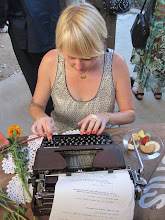He’s talking about serendipity—making fortunate discoveries by accident. While plenty of Griswold’s road trip discoveries were less than opportune (e.g., cousin Eddie’s Hamburger Helper), his point is that serendipity is inherent to the journey. And thanks to technology, it’s under attack. Wait...what?

Last week, I read William McKeen's New York Times article (aptly titled “Serendipity”). He believes technology undercuts serendipity. While it leads to more choices and greater efficiency, in his words “there’s an emptiness in finding something quickly.” Because it is so easy for us to find exactly what we are looking for, we lose out on those dear moments of surprise that leap out from the shadows and send our hearts racing in unanticipated directions.
Coincidentally, I saw a coworker’s tweet (thanks @alexesterchung) linking to Steven Berlin Johnson’s reaction to the McKeen article. SBJ’s take? Technology increases serendipity, making it easier to find random information or wander down non-linear paths. He refers to serendipity as “stumbling across something accidentally that is nonetheless of interest to you.” Keep that last bit in mind.
My opinion stands somewhere between those of McKeen and SBJ. Call me out for taking the easy road, but I think technology increases the amount of serendipity while decreasing the potency of it. Technology makes it incredibly easy for me to find content both related to and independent of what I’m looking for. I am a few clicks away from figuring out what to do with the lemon balm growing in my window garden. And perhaps while I’m clicking, I’ll find a tasty recipe for lemon shortbread cookies. Or I’ll go completely off track and (somehow) end up reading about the new G.I. Joe movie. I wouldn’t encounter these while thumbing through The Complete Book of Herbs.
Serendipity, however, implies randomness within the equation. It is accidental in that it doesn’t relate to what you were doing or searching for. Technology makes the “randomness” less random (if more frequent). Sites like StumbleUpon and Pandora, both brilliant, expand my cultural or musical horizons within certain genres, but they don’t dabble far beyond the boundaries of my core interests. That’s not what they’re intended to do. Some see sites like these as supporting homophily—the opposite of serendipity.
While there is an endless amount of fascinating and irreverent content online, completely random searches aren’t often fruitful. That is where they parallel the pre-internet days of yore. Scouring library shelves and rolling up your sleeves in some good, old-fashioned research is a painstaking process, but it makes those fortuitous occurrences all the more enchanting. For more on the internet, homophily, and hopes for a serendipitous digital future, have a look at this Ethan Zuckerman post. And here, my colleague Ida Benedetto recaps Zuckerman's take on serendipity and how we consume and interpret media.
While technology has made the road to serendipity narrower, that road is full of more frequent and more relevant surprises—in that they related to areas you're already interested in. Yet I still love getting ink on my fingers knowing I’ll find articles and stories that will never show up in my RSS feeds.








